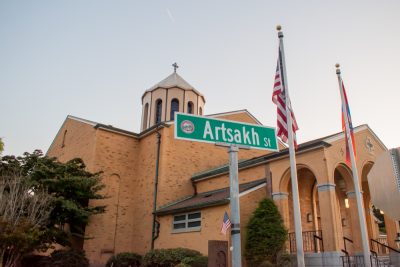
Local Armenian groups are taking action in response to the humanitarian crisis in the Nagorno-Karabakh region, also called Artsakh, a contested region between Azerbaijan and Armenia. Most recently, community members rallied at the Armenian Heritage Park to raise awareness.
Shant Parseghian, founder of the Pan-Armenian Council of New England and a Boston-based Armenian physician, said the objectives of his organization are to raise awareness of Armenian goals and preserve their culture through advocating for their land, which is a part of their identity.
“So far, we’ve organized two major events, one was a rally in front of the State House … to raise awareness among local politicians,” Parseghian said. “Our second largest event was this past weekend’s rally, when we were able to get every Armenian party representative, director, plus the churches and the leaders to come all together to enact their voice.”
Since Sept. 19, over 100,000 ethnic Armenians have been forced to flee the region after a military offensive was launched by Azerbaijani forces, according to the Associated Press.
The most recent military operation and exodus of ethnic Armenians resulted in Azerbaijani forces reclaiming full control of the region. According to CNN, President of Artsakh Samvel Shahramanyan signed a decree agreeing for all the institutions and organizations of the Republic to dissolve.
Parseghian said he is worried about the future of the region.
“Nagorno-Karabakh pretty much will cease existing starting Jan. 1, 2024,” Parseghian said. “So, we are very concerned that we may lose our country, our heritage, in the next couple of years if this plan continues to take place.”
The ethnically-Armenian region of Artsakh declared itself an independent and self-governed state in 1991. Since then, the status of the region has been in conflict because the region is dominated ethnically by Armenians, but the international community recognizes the region as part of Azerbaijan, according to Al-Jazeera.
Anais Astarjian, a former Boston resident and community liaison at the Armenian Office of the High Commissioner for Diaspora Affairs, decided to volunteer with a nongovernmental organization, All For Armenia, at the Southern Armenian border as soon as the turmoil escalated.
“I’m thinking of how to explain it properly, because it was so, so tragic and devastating,” Astarjian said. “They feared so much for their lives that they knew they had to leave.”
Astarjian assisted in the distribution of basic necessities to the displaced communities, providing food, water and blankets to individuals.
“People … really needed hygiene products, blankets, clothes, those basic necessities because most of them left with nothing,” Astarjian said. “I saw so, so many people leave in their small cars with six people packed in them and as many things they can fit in the car as possible.”
In addition to these humanitarian impacts, Parseghian also raised concerns regarding the political and economic consequences this military offensive and the subsequent refugee crisis will have.
“Armenia is already a struggling country economically, so now adding 150,000 refugees to a country of only 3 million … [this] will make the resources much more limited,” Parseghian said. “Both Armenians from Artsakh and Armenians in Armenia [will] suffer from the consequences of displacing the Armenians of Nagorno-Karabakh.”
Throughout Massachusetts, Armenian organizations have given donations to support relief efforts in the region.
Barbara-Seda Aghamianz, a volunteer on the board of directors of the Armenian Relief Society of Eastern USA, said the humanitarian organization has donated $50,000 to support the displaced Armenians. Funds are sent directly to Armenia where necessities are purchased on the ground.
“Right now, it’s a matter of helping the refugees … it’s kind of a crisis mode that we’re in right now,” Aghamianz said. “These people haven’t had good food for nine months … it’s [about] feeding them and assessing the situation.”
The Boston community can donate to organizations and sign petitions to support the displaced Armenian populations. Astarjian also highlighted that individuals can contribute not only financially, but also through educating themselves and others about the matter.
“The main thing that the Armenians in Boston or in the U.S. can do … is to increase their involvement in advocacy, reaching out to your elected officials, telling them family stories,” Astarjian said. “I think it’s really important for Americans to look into this and to look into also non-biased sources because a lot of what is being put out there is just not true.”
